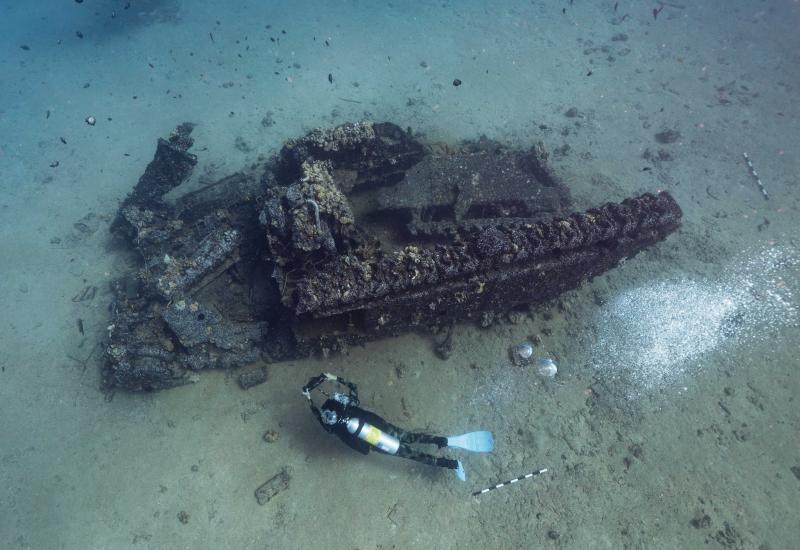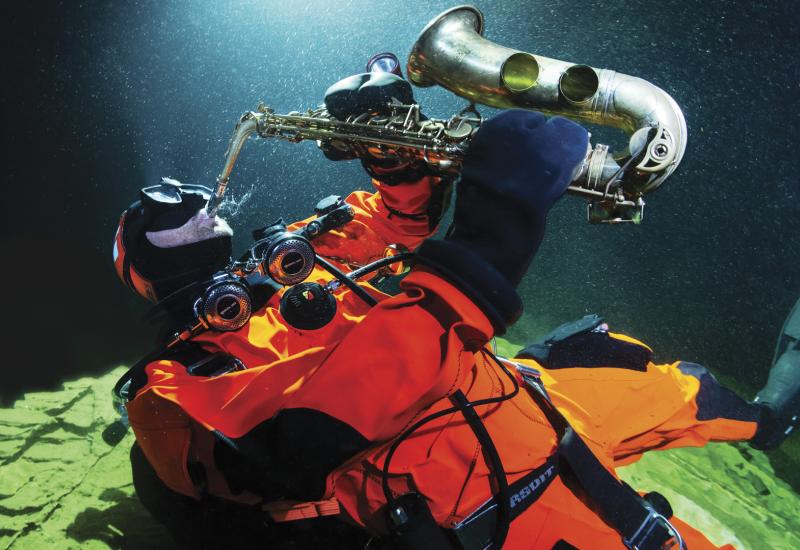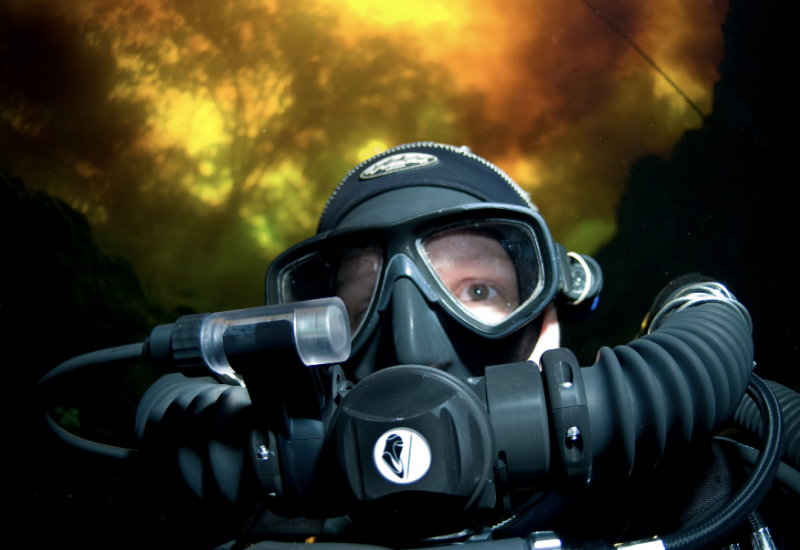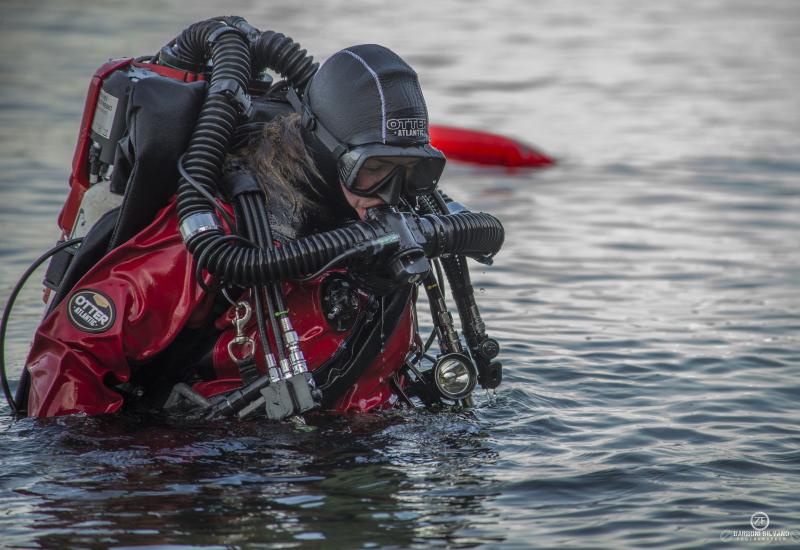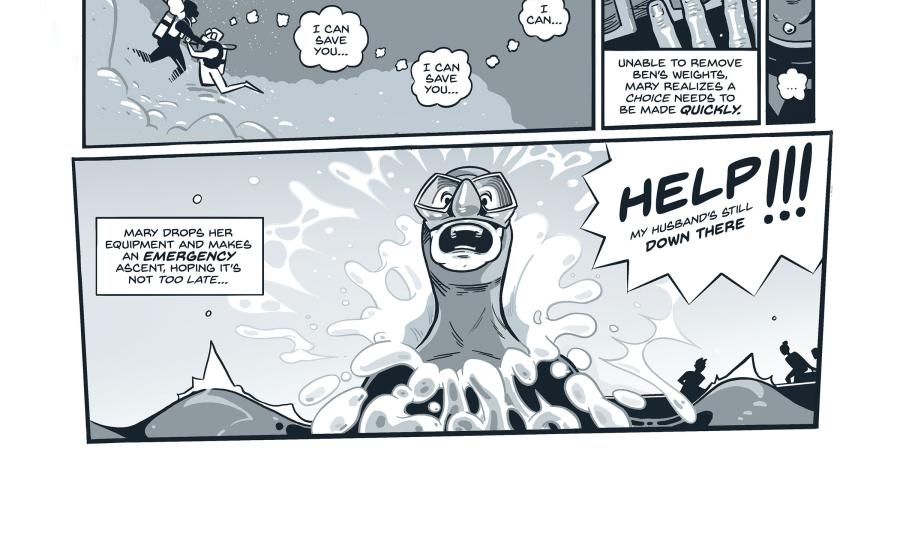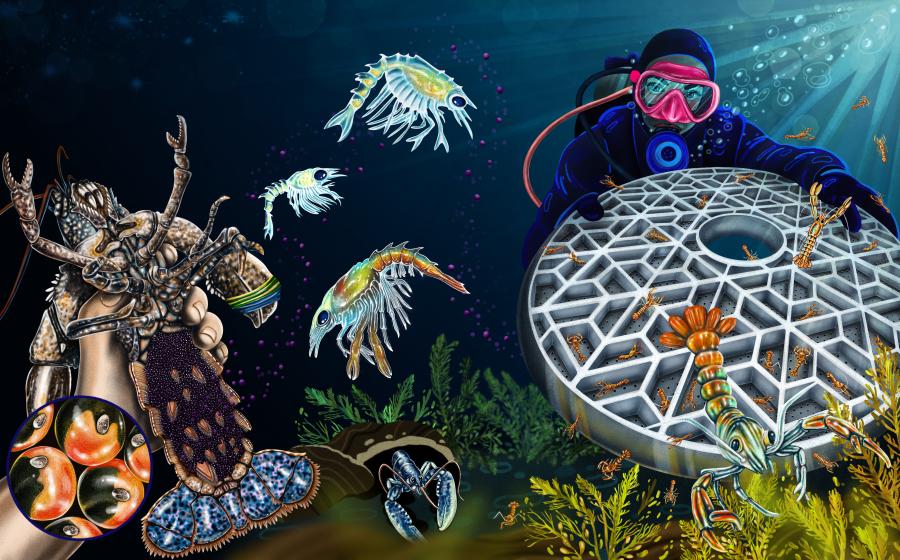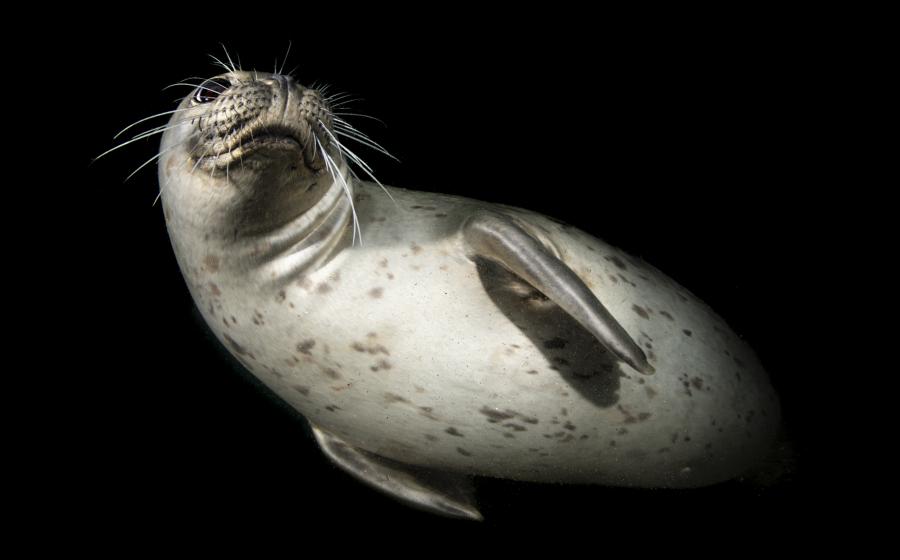Facing Fear With Nathalie Lasselin: On Embracing the Unknown
Nathalie Lasselin is a French underwater filmmaker, tec instructor and explorer who studies the relationship between humans, our well-being and the environment. She currently resides in Montreal, Canada. In 2018, she spent 30 hours underwater in the St. Lawrence River, traversing the island of Montreal from one end to the other. She dived 44 miles of the river and ate, drank and slept underwater.
Her work has brought awareness to the importance of freshwater ecosystem preservation and clean drinking water. While on filming assignments, she has dived to depths of more than 400 feet in caves, explored shipwrecks and dived under ice in the Arctic. Here are her tips on conquering fear.
Nathalie LasselinLasselin and a team of divers pose with an array of diving gear during a 2023 expedition to Manicouagan Crater in Canada.
How did you first get into tec diving?
Well, I did my open-water training, and two months later I started doing technical diving because on one of my first dives I was looking at the bottom, it was pitch black, and I was like, well, I want to go there, but I don't want to die. I met someone with two tanks on his back, and I was like, OK, so that's the way to do it. And from that day, it completely changed my life.
Can you explain what exploration diving encompasses? Is it simply going places other people have not been before?
For me, exploration means going to a place that nobody or only a few people have gone before, but to call it exploration, you need to come back with some new information. So there's a lot of research, a lot of protocols, a lot of work. And nowadays, it's not only filming, but documenting and working with scientists and historians. So it's really going to a place and coming back with new information ready to be shared on different level.
Tell me the how you felt the first time you went exploring.
The first time, you have a lot of apprehension. You're anxious because so many people around you tell you that it may go wrong, you may die, and it’s dangerous. So back then that was putting a lot of pressure on me. I was really excited, but at the same time, I had some apprehension. I thought maybe something would go wrong, and we don't know what's going to happen.
Are most of your exploration dives in caves?
Cave diving, wreck diving and really long dives. I did a 44-mile dive in the St. Lawrence River in Montreal six years ago. It took me a total of 30 hours. So it's a mix of caves and decompression dives. One of the projects we're doing is in the fourth-biggest crater in the world, which has been flooded for hydroelectricity. So we're doing deep, cold dives in that place. What leads me to a place is the question: “What is the story that we don't know about?” There are a lot of beautiful places that, yeah, sometimes I will go and dive, but if I have seen many pictures already, I kind of already know the answer [to that question], so that doesn’t really motivate me. What does motivate me is seeing a place and not having a clue what is there. Google Maps cannot tell me, nobody knows. And I'm like, Well, I'm going to figure that out. That’s really what pushes me to go places that are not known.
Related Reading: What It's Like to Be a Cavern Guide in Mexico
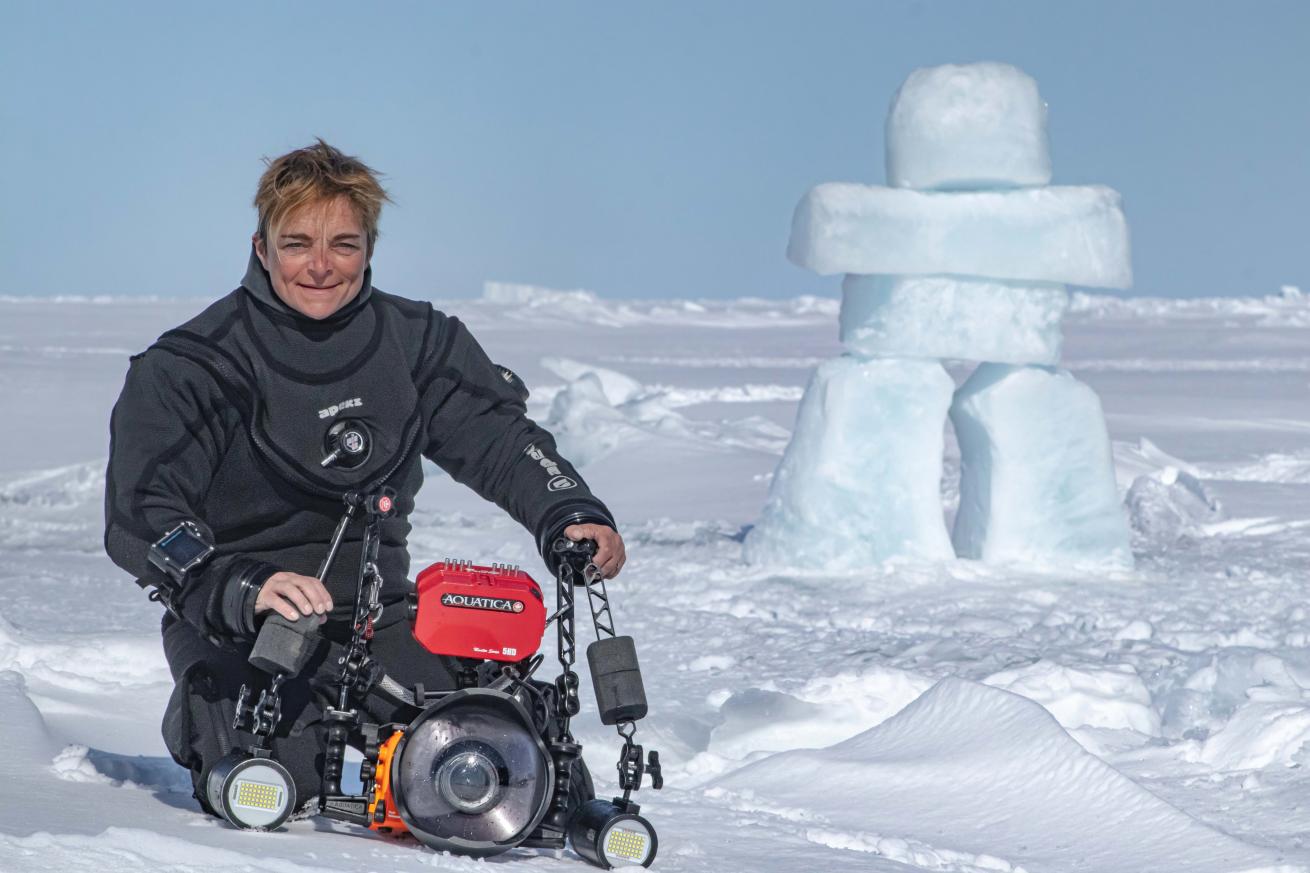
Julien BourquePortrait of Nathalie Lasselin before a dive in the Canadian Arctic.
Have you ever experienced panic? How did you handle that?
I've experienced the beginning of it, when your breathing rate becomes more rapid and you feel you may lose control. This happened to me at the beginning of my technical dive career. I used the technique of controlling my breathing and asking myself, what is it that I'm scared of? I knew this feeling was happening because it was trying to tell me something. So either it's telling me you're not ready for this, you didn't do all your homework. Maybe there are some environmental conditions you don’t know how to control for, or maybe it's just a fear that someone or your apprehension gave you, but it's not a real fear. So I stop, breathe, and I ask myself, “What is this fear telling me?” Then I can control the situation and go back to what I'm supposed to do.
Have you ever called a dive because of fear?
I never called it during a dive. But I have called the dive before getting in. For example, a long time ago I was doing a documentary about a shipwreck. And that day there were so many things in my head; I thought, you know what, I'm not focused on the dive, so I don't want to put myself nor my dive buddy in a situation where I'm not 100 percent focused on what I'm doing. So I just told the guys, this is your mission, you do the dive, and I'm going to do the filming and the survey. And tomorrow I’ll be one other person there to do it. So I think it's really important to respect myself and my team and not to put anyone in danger, just in case.
How do you prepare yourself mentally and physically for a dive that will challenge you?
I keep myself in shape, I make sure that all my equipment is properly set up, and I do a lot of visualization. This is really important for me. I consider what can go wrong, what my options are, and how I can avoid being in those situations. I also do a lot of hypnosis. When I did my long dive [on the St. Lawrence River], I even became a hypnotherapist. For me, it was a really good tool to be able to make sure that not only my conscious brain, but my subconscious was ready to help me in a situation where it might be really challenging and where I can face something I didn't think of before the dive. So there's a lot of mental rehearsal of the dive before I do it.
Related Reading: Facing Fear With Jill Heinerth: Focus On Breathing
What advice would you give to someone who wants to train themselves to conquer to conquer their fears?
It is very important to listen to the fear and understand why we have them. There are two kinds of fear: real fear and fear that doesn’t belong to us. Sometimes, fear can come from childhood or someone else. Maybe someone is just transmitting their fear to us, but it has nothing to do with us. Real fear is trying to prevent us from being in a bad situation, and we need to be really humble about what we can do and what we can’t do. Maybe we are not ready, or we don’t have what it takes at that moment. Maybe later on we will have what it takes. It’s really important for me to make the difference between those two kinds of fears, because sometimes it’s just understanding that we’re taking on fears that don’t belong to us, and we need to let them go. So, it is important to listen to the fears, talk to them as if they were a person and even reassure them sometimes. Fear is something I do not avoid talking about with my students and buddies. I put everything on the table. Most of the time when I’ve got fear that might stop me from doing something, I’m like, “I’m going to try it.” You’ve got two options. Either your fears stop you from doing stuff that could be amazing, or you try to overcome them. And worst-case scenario, you say, “Well, I did it. It was OK, but I don’t want to do it another time.” Or you’re like, “Wow, it was so amazing.”
What is one of the best pieces of advice you have received?
When I started cave diving, I did an interview with a cave diver, Jim Bowden, who set a world record for deep diving in 1994. He told me: “Never change your rhythm of breathing. Control it; don’t let your breathing control you,” meaning don’t let your emotions control you. And for me, that was really great advice.
If you could speak with a younger version of yourself, what advice would you give her?
Don't put don't put any barriers in your path. There will be other people that will do it for you. Don't put them there for yourself.

